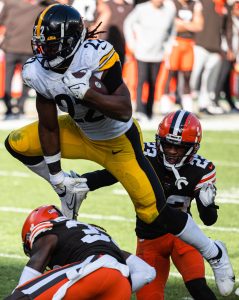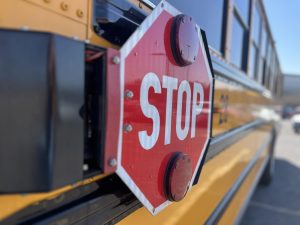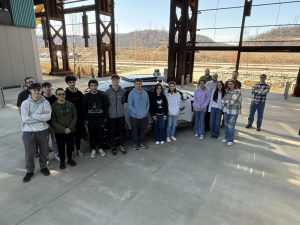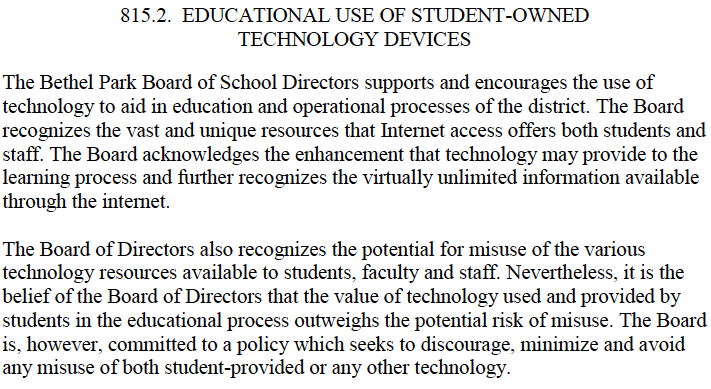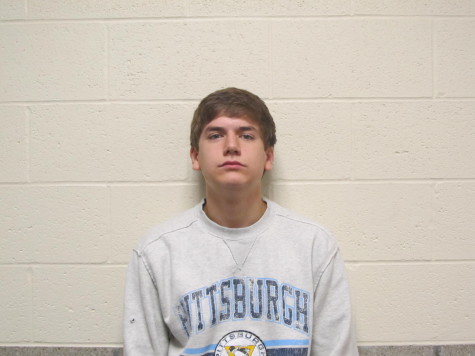The use of technology in the classroom in today’s society is huge. The possibilities are endless: Smart Boards, COWS (computers on wheels), iPads, touchscreen projectors, and of course, cell phones.
The policy for cell phones within BPSD has morphed throughout the years; as of now, students are permitted to use their cell phones within the classroom for educational purposes at the discretion of their teacher, based on the Code of Conduct. Currently, students are not allowed to use their cell phones in the cafeteria or in the halls. However, for Bethel Park students, the policy may change in the near future.
“Recently, the school board passed a policy so the Code of Conduct can be extended further. Basically, in order to impact or change the Code of Conduct, the Federation of Teachers have to come together and agree upon the policy. Then, the school board has to approve the teachers’ recommendation,” Dr. J states.
The positive side of this cumbersome process is that “it gives everybody an opportunity to add value to any decision-making, and it also causes a formal communication session so there are no arbitrary changes by any group. In addition, it works well in conjunction with both parties seeing the recommendations and then the school board approving it,” Dr. J states.
Furthermore, there are two policies put in place. One is the use of technology and the other is bring your own SOTD; the technology policy was altered to be in conjunction with the SOTD policy. Nevertheless, electronic devices utilized within the classroom have recently been called Student Owned Technology Devices (SOTD) through policies 237 and 815.2 that have been put in place and established.
According to policy 237, students would be able to use their phones or smart phones between periods, during study hall, or during lunch, but with some limitations.
According to Dr. J, “A student cannot use their 3G or 4G cellular data to browse the web. They must log in on the Bethel Park Student server with their student ID and password.”
Furthermore, the reason why the District is pushing this policy is because of the benefits of technology in the classroom as a whole– now let’s be real; technology is the future.
Whenever we were in the old campus, there were only a couple of projectors and Smart Boards and most of the time the teachers had to “fight” for a time to use them.
Conversely, the new school features classrooms complete with the latest in cutting-edge technology. Every classroom contains state of the art Epson projectors and a plethora of white boards. The kiosks throughout the school allow the students to access important information and news that’s happening around the school.
The point is, technology is the future and electronic devices need to be incorporated into the classroom in order to keep students engaged and to keep the lessons fresh for even the teachers. Not only will SOTD keep students engaged, but the usage of them will allow students to access important information with only the touch of a button.
In addition, the utilization of SOTD’s in the hallways and cafeteria will encourage students to come to school and learn; cell phones during study hall and cafeteria also free up and allow students to check e-mails for meetings for extracurricular activities as e-mail is the main line of communication nowadays.
Lastly, the obvious policy change that could take place in the near future proposes an interesting question. Could the cell phone policy become an extreme distraction in the classroom?
Dr. J agreed that the policy could evidently become a distraction, but if a student disregards the policy, there will be repercussions and the student will pay the consequences. There is always a consequence for everything and if there is a distraction, then that will be addressed accordingly.
Dr. J encourages that technology and cell phones are education pieces, which means technology should never govern or run the classroom, it’s there to aid the students. If BPHS isn’t using technology in the classroom, they are clearly missing an opportunity.
Nonetheless, all of these instances and examples have been clearly stated in the electronically available version of the Student Handbook, so students won’t have an excuse for not “understanding” the policies.
Again, Dr. J indicates that the policy will not come into effect until the Federation vote is favorable and the School Board approves. Once that occurs, grade-level assemblies will take place during which students will be informed of the new policy and begin the new process.
In the meantime, students can continue to use their SOTD only during class time for educational purposes, as directed by the teacher.
For more information, please visit these links:
Policy 237: http://www.bpsd.org/Downloads/237%20Electronic%20Devices3.pdf
Policy: 815.2: http://www.bpsd.org/Downloads/815%202%20%20Educational%20Use%20of%20Student-Owned%20Technology%20Devices5.pdf


